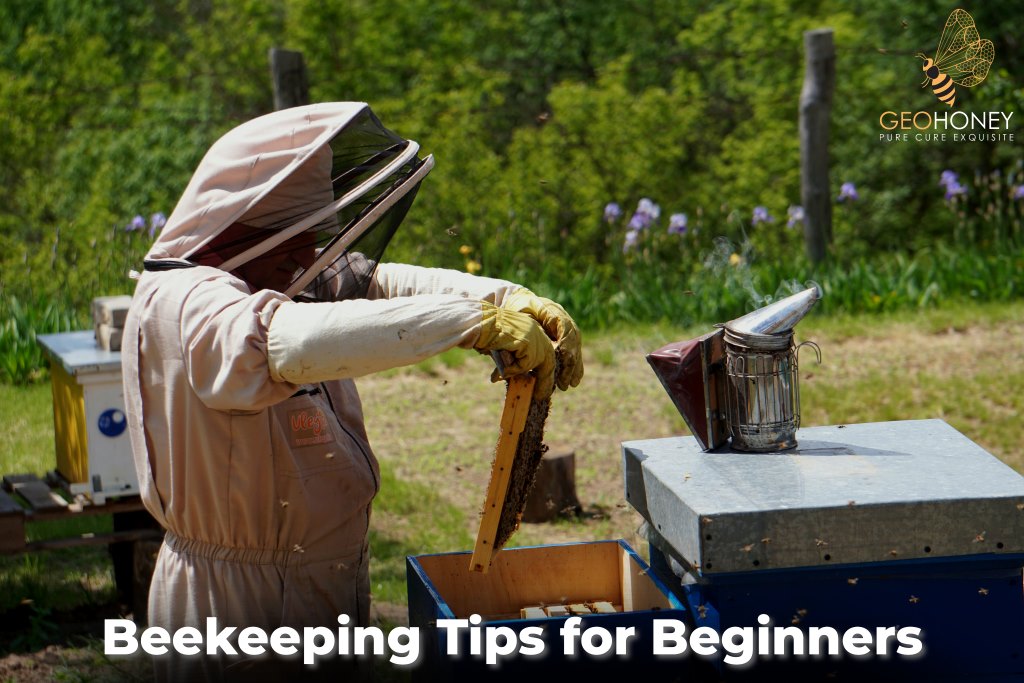- Tokyo: 15:06
- Singapore: 14:06
- Dubai: 10:06
- London: 06:06
- New York: 01:06
Beekeeping for Beginners: Top Tips for Producing Natural Honey

Beekeeping Tips for Natural Honey
Beekeeping is not only a rewarding hobby but also a vital practice for the preservation of these precious pollinators. Not only do bees play a crucial role in our ecosystem, but they also produce one of nature's most delicious and nutritious gifts: honey. If you're a beginner beekeeper looking to produce your own natural honey, Geohoney brings this blog post for you. We'll explore some essential tips and tricks that will set you on the path to success.
1. Educate Yourself
Before diving into beekeeping, it's crucial to educate yourself about the bees, their behavior and the necessary equipment. Attend local beekeeping workshops or join online communities where experienced beekeepers share their knowledge. Familiarize yourself with the different types of hives, bee species and beekeeping techniques. The more you know, the better prepared you'll be to care for your bees and produce high-quality honey.
2. Choose the Right Location
Selecting the right location for your beehives is vital for their success. Bees thrive in areas with abundant nectar and pollen sources, away from pesticides and harmful chemicals. Ideally, choose a location with a mix of flowering plants throughout the year. Ensure that your beehives have access to direct sunlight for at least a few hours each day and are protected from strong winds.
3. Invest in Quality Equipment
Investing in high-quality beekeeping equipment is essential for both the well-being of your bees and the quality of your honey. Purchase sturdy beehives, frames and protective gear such as bee suits, gloves and veils. Additionally, acquire a smoker, which helps calm the bees during hive inspections. Having the right tools will make your beekeeping journey smoother and more enjoyable.
4. Start with a Strong Colony
When starting beekeeping, it's recommended to begin with a strong colony rather than catching wild swarms. Purchase your bees from reputable suppliers who provide healthy and disease-free colonies. Starting with a strong foundation will increase your chances of success and honey production.
5. Provide Adequate Food and Water Sources
To ensure your bees produce ample honey, it's crucial to provide them with sufficient food and water sources. Plant a variety of flowering plants in your vicinity to offer a diverse range of nectar and pollen. Consider planting bee-friendly flowers such as lavender, sunflowers, and borage. Additionally, provide a water source like a shallow birdbath with floating objects for the bees to land on and access the water.
6. Practice Natural Beekeeping Techniques
For those aiming to produce natural honey, practicing organic and sustainable beekeeping techniques is essential. Avoid using chemical pesticides and herbicides in the vicinity of your hives, as they can harm the bees and contaminate the honey. Instead, focus on natural pest management methods, such as promoting strong bee colonies, using screened bottom boards, and providing adequate ventilation.
7. Harvest Honey Responsibly
When it's time to harvest honey, do so responsibly to ensure the health and well-being of your bees. Only remove surplus honey, leaving enough for the bees to sustain themselves through the winter. Use proper beekeeping tools and techniques to extract honey without causing harm to the bees or the hive. Remember, responsible harvesting leads to sustainable beekeeping practices.
8. Connect with Local Beekeepers
Building a network of fellow beekeepers can provide invaluable support and knowledge-sharing opportunities. Join local beekeeping associations or clubs to connect with experienced beekeepers in your area. Attend meetings, workshops, and beekeeping events to learn from their experiences and gain insights into regional beekeeping practices. Local beekeepers can offer guidance specific to your geographical location and help you overcome any challenges you might face.
9. Stay Curious and Observe
Beekeeping is a continuous learning process, and observation is key. Regularly inspect your hives to ensure the health of your bees and identify any potential issues. Pay attention to their behavior, the presence of pests or diseases, and the availability of food sources. By staying curious and observant, you can make informed decisions and take proactive measures to maintain healthy colonies and produce delicious natural honey.
Conclusion
Beekeeping for beginners can be an exciting and fulfilling journey. By following Geohoney’s top tips, you'll be well on your way to producing your own natural honey while contributing to the well-being of bees and the environment. Remember, beekeeping requires patience, dedication, and a deep respect for these incredible creatures. Enjoy the process, stay curious, and savor the sweet rewards of your hard work and commitment to sustainable beekeeping practices.




We have every way to be a beekeeper, but of course, we must be observant of our environment, especially of bees. We must adjust for them.